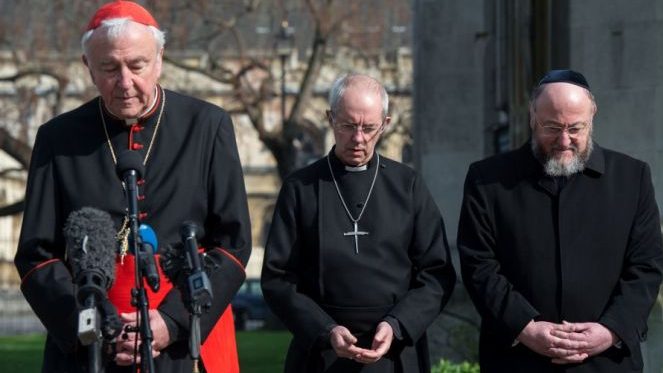Catholic, Anglican, and Jewish leaders have issued a joint appeal to U.K. lawmakers to reject a bill that would legalize assisted suicide.
In a letter issued on Oct. 19, they expressed “profound disquiet” over the Assisted Dying Bill, which has its second reading in the upper house of the U.K. Parliament on Friday.
The private members’ bill, introduced in the House of Lords in May by Molly Meacher, seeks to “enable adults who are terminally ill to be provided at their request with specified assistance to end their own life.”
“As leaders of faith communities, we wish to express our profound disquiet at the provisions of the ‘Assisted Dying’ Bill currently in the House of Lords,” said the religious leaders in the letter sent to members of the Lords.
The text was signed by Cardinal Vincent Nichols, the president of the English and Welsh bishops’ conference, Justin Welby, the Archbishop of Canterbury, and Ephraim Mirvis, Chief Rabbi of the United Hebrew Congregations of the Commonwealth.
The trio noted that Meacher introduced the bill with the stated aim of alleviating suffering.
“This motivation we share wholeheartedly, but we disagree on the means advanced to address this very real concern,” they said.
“In particular, we are conscious of the risks and dangers entailed in the provisions of the bill and the ‘real-life’ practical inadequacies of the proposed safeguards.”
The bill is the latest in a long line of attempts to legalize assisted suicide in the U.K.
The proposed legislation would authorize people in England and Wales who have signed a declaration expressing “a voluntary, clear, settled and informed wish,” countersigned by two “suitably qualified” registered medical practitioners, to seek consent for assisted suicide from the Family Division of the High Court in London.
The bill is facing opposition from medical professionals, as well as Catholic leaders such as Bishop Mark Davies of Shrewsbury, Bishop Patrick McKinney of Nottingham, and Westminster auxiliary Bishop John Sherrington.
Nichols, Welby, and Mirvis said that their opposition to the bill was rooted in a conviction that every human life is sacred.
“By the faiths we profess, we hold every human life to be a precious gift of the Creator, to be upheld and protected. All people of faith, and those of none, can share our concern that the common good is not served by policies or actions that would place very many vulnerable people in more vulnerable positions,” they wrote.
“We appeal to people of whatever faith or belief to join us through our common bond of humanity in caring for the most vulnerable people within our society.”
The three men called for “high-quality palliative care” to be made available to everyone nearing death.
“We believe that the aim of a compassionate society should be assisted living rather than an acceptance of assisted suicide,” they said.
In September 2020, the Vatican’s doctrinal congregation reaffirmed the Church’s perennial teaching on the sinfulness of euthanasia and assisted suicide.
Since then, supporters of the practices have made gains in several European countries.
In March, Spain’s legislature approved a bill legalizing euthanasia and assisted suicide, making Spain the fourth country in Europe to endorse the practice, after the Netherlands, Belgium, and Luxembourg.

